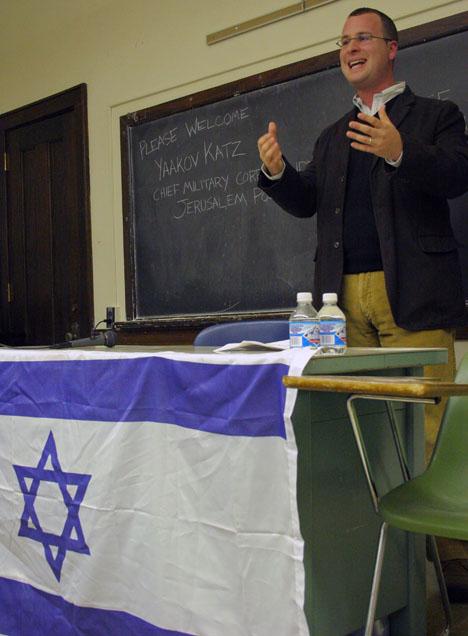Israelis discuss impact of war
Chief military correspondent for The Jerusalem Post, Yaakav Katz, discusses the thirty three day war in Lebanon and how it has affected Israel, Thursday, October 26, 2006. Katz was in an out of Lebanon and northern Israel during the war and recalled one Brad Vest The Daily Illini
Oct 30, 2006
Last updated on May 12, 2016 at 05:51 a.m.
Two Israeli journalists visited the University last week to discuss the effect that the Lebanese-Israeli conflict has had both on Israel and on the rest of the world.
The speakers, Yaakov Katz of the Jerusalem Post and USA today and Yaron Deckel, Washington bureau chief for the Israel Broadcasting Authority, discussed the 33-day war between Israel and Lebanon and also the threat of Hezbollah and Iran.
Katz said that students should know “the results of Lebanon, the effects of Israel’s questionable victory and its results on Israel’s strategic standing on the area.” He added that Iranian nuclear proliferation would destabilize the Middle East.
“Israel is the sole democracy in the middle east – the sole Western entity,” Katz said. He said that Israel is the only “permanent force” in the region, amidst the threat of “post-9/11 Islamist terror.”
Get The Daily Illini in your inbox!
Hezbollah is not only trying to destroy a Jewish state in Israel, but a way of Israeli life, Katz said.
Deckel said that for the Israeli Defense Force soldiers, it was important to remember their purpose in Lebanon, and what they were there to do. He also said that it is important to note how risky it was for the soldiers and for the journalists who covered the war. He said that part of the job of the journalist to bring the story “into the living room of the people.”
Once the war was over, he said, Israel became very safe.
“If you travel to Israel, you hardly know that there was a war,” he said.
The main fruit of the war was United Nations Resolution 1701, which forced the Lebanese government to send troops into southern Lebanon to help control Hezbollah for the first time in over ten years.
Deckel said that the popularity of Hezbollah in Islamic countries is worrisome, especially in regard to Sheikh Sayyed Hassan Nasrallah, because the moderate Arab regimes now have to contend with extremists.
“Israel has a feeling of uncertainty; we don’t know what is to come of this war,” Deckel said.






